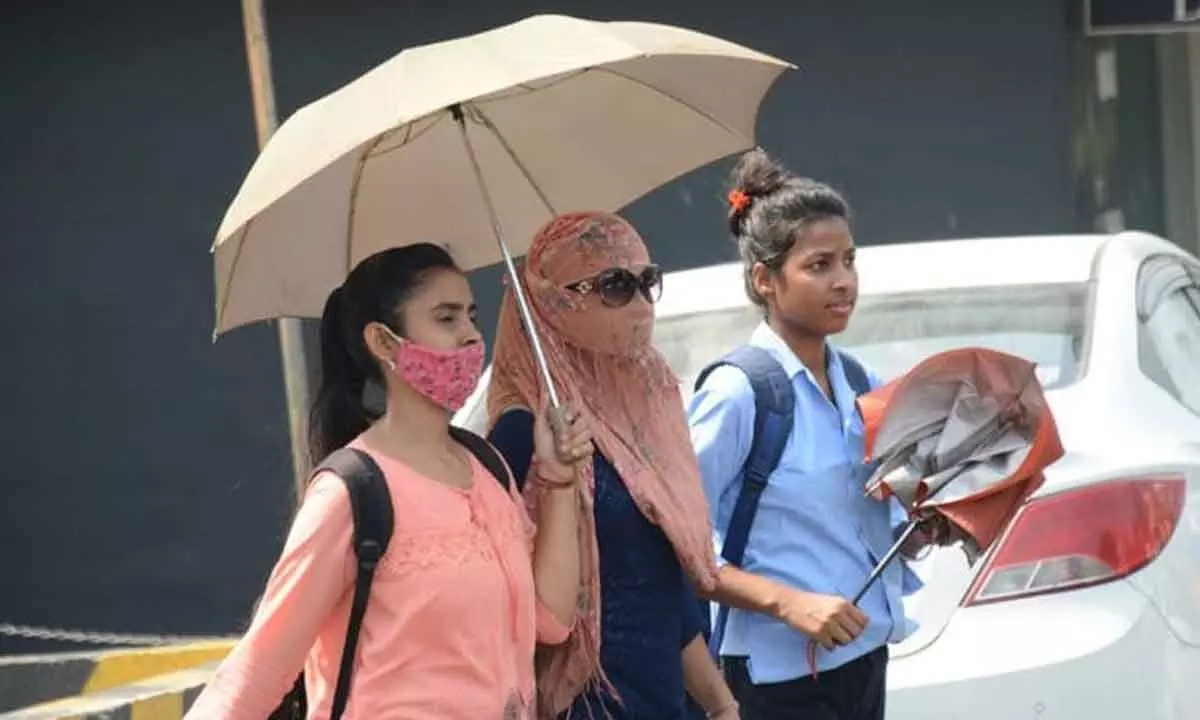Live
- Mamata doesn't want INDIA bloc to succeed, claims BJP's Rahul Sinha
- Air India Express cancels flights at Chennai airport due to deluge
- Kejriwal promises Rs 2,100 for Delhi women if AAP wins polls, BJP takes ‘lollipop’ jibe
- JPC Chairman supports Assam govt's 'No NRC, No Aadhaar,' rule
- Stoinis vows to revive Melbourne Stars’ glory with fresh leadership
- DDA easing freehold conversion of shops: MoS Sahu
- CP Sudheer Babu Updates on Manchu Family Cases
- Keerthy Suresh Marries Long-time Friend Antony Thattil in Goa
- Siddaramaiah govt defends police action on Panchamasali Lingayat protesters
- India fined for slow over-rate in second WODI against Australia
Just In
Above normal temp in store for 5 days: IMD


Northwest, central and east India are predicted to record maximum temperatures three to five degrees Celsius above normal over the next five days, the India Meteorological Department (IMD) said on Thursday
New Delhi: Northwest, central and east India are predicted to record maximum temperatures three to five degrees Celsius above normal over the next five days, the India Meteorological Department (IMD) said on Thursday.
Many parts of the country are already recording temperatures that are usually logged in the first week of March. It has fuelled concerns about an intense summer and heat waves this year. "Maximum temperatures are very likely to be three to five degrees Celsius above normal over most parts of northwest, central and east India during the next five days," the IMD said in a statement. It said a significant change in maximum temperatures in northwest India is unlikely during the next two days.
However, the mercury is predicted to rise by two to three degrees Celsius thereafter. The mercury may soar to 40 degrees Celsius and above in one or two meteorological subdivisions of northwest India in the first half of March, an IMD official said.
The Met office has attributed the unusually hot weather in February to several factors, with the absence of strong western disturbances being the primary reason. Strong western disturbances bring rainfall and help keep temperatures down. Delhi on Monday recorded the third hottest February day since 1969 with the maximum temperature at the Safdarjung observatory, the national capital's primary weather station, soaring to 33.6 degrees Celsius.
The city had recorded an all-time high of 34.1 degrees Celsius on February 26, 2006, and a maximum temperature of 33.9 degrees on February 17, 1993. The Met office has issued advisories, saying significantly higher-than-normal temperatures may have an adverse impact on wheat and other crops.
"This higher day temperature might lead to an adverse effect on wheat as the crop is approaching reproductive growth period, which is sensitive to temperature," it said. High temperatures during the flowering and maturing periods leads to loss in yield. There could be a similar impact on other standing crops and horticulture, it said. The IMD said farmers can go for light irrigation if the crop appears to be under stress.
"To reduce the impact of higher temperatures, add mulch material in the space between two rows of vegetable crops to conserve soil moisture and maintain soil temperature," it said. On Monday, the Union Agriculture Ministry said it has set up a committee to monitor the situation arising out of the increase in temperatures and its impact, if any, on the wheat crop. The Indian Council of Agricultural Research has also developed a new wheat variety which can overcome the challenges arising out of changes in weather patterns and rising heat levels. In March last year, the warmest recorded in the country since 1901, heat caused a decline of 2.5 per cent in wheat yields. The weather department had attributed the unusual heat to the lack of rainfall due to the absence of active western disturbances over north India and any major system over south India. The country as a whole had logged just 8.9 mm rainfall, which was 71 per cent lower than its long period average of 30.4 mm.

© 2024 Hyderabad Media House Limited/The Hans India. All rights reserved. Powered by hocalwire.com






